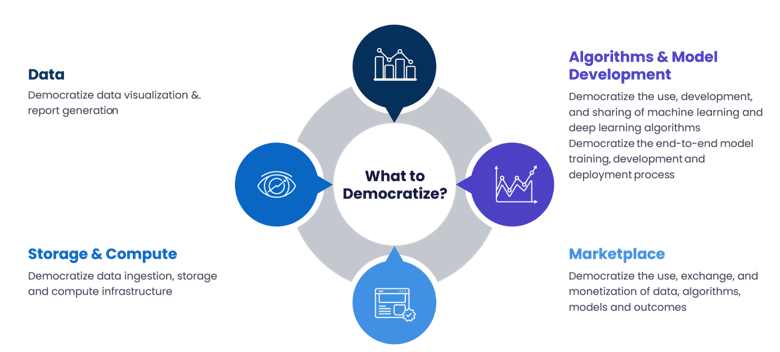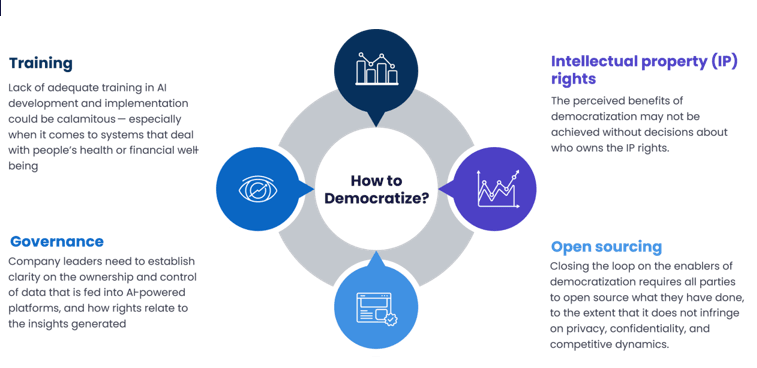Democratizing AI: Empowering the Masses with Artificial Intelligence
The distribution of artificial intelligence research to a larger user population, including individuals without specialized AI skills, is known as “AI democratization.” Large corporations with significant investments in artificial intelligence, such as IBM, Amazon, Facebook, Microsoft, and Google, are driving the trend to advance its advancement and uptake.
The creation of AI has traditionally required a significant investment of time, money, and resources like specialized knowledge and processing capacity. AI democratization entails making creation easier by offering approachable tools and resources, like ready-made algorithms, clear user interfaces, and high-performance cloud computing platforms. The presence of those supports enables internal developers without specialized knowledge to produce their own machine learning applications and other AI technologies.
Artificial Intelligence – the next digital frontier
Artificial intelligence, which is influencing every aspect of global culture and society, is commonly viewed as the next digital frontier. AI is a quickly developing business that is expected to significantly alter the global labour and economic landscape. We have seen enormous developments and accomplishments in the field of artificial intelligence over the previous few decades. The global AI market is anticipated to increase by $76.44 billion between 2021 and 2025, expanding at a 21% CAGR. With its potential to alter our civilization, artificial intelligence is today regarded as a revolutionary technology and a stride toward the future.
Benefits of AI Democratization
- Lowering the entry hurdles: The entry barriers for people and organizations are lowered via AI democratization. Anyone can start testing and building AI models on cloud infrastructure using publicly available techniques and data. The more businesses and users that can employ AI, the more benefits there will be.
- Overall business upgrading/improvement : By bringing business and technology even closer together, AI democratization creates a strong connection between the two. While most people think AI is solely about technology, democratizing AI is more about business outcomes.
- Societal change: With growing understanding of and use of AI, societal issues like healthcare, law enforcement, and global challenges like climate change will all be improved.
- Increased Automation: According to Gartner’s forecast, as AI becomes more accessible, most tools will be automated, enabling a higher level of self-service. Automation will therefore unleash the possibilities of any business.
Challenges to implementing AI solutions
The most powerful companies in the world, including Google, Microsoft, Amazon, Facebook, and others, have a vast amount of data and are experts at using AI to analyse it. Only a small number of businesses, nevertheless, are utilising AI for their primary operations. According to a study by MMC Ventures, just 60% of the 2830 startups in Europe that were examined were leveraging AI as part of their value offering. And this number would have fallen much lower had start-ups and established businesses also been counted. Although it seems unexpected, it is real. This is because a wide range of complex abilities are needed to execute AI solutions.
Exhibit 1

Exhibit 2

Initiatives for AI democratization
The printing press’s invention in the 1400s, which gave practically everyone easy access to information, was the first step toward democratization. Everyone was able to start learning thanks to the explosion of information that arose from it. Many businesses today are using AI technologies and appreciating their results. The Democratization of AI has been adopted as the main objective by the big IT companies including Microsoft, Google, and IBM.
- Microsoft’s strategy for democratizing AI: Microsoft has an ambitious and comprehensive plan to de-elitistize artificial intelligence (AI) and make it available to all. Microsoft is pursuing the goal of democratizing AI by following the four points outlined below:
- Use AI to transform how people interact with ambient computing.
- Incorporating intelligence into every programmed we use on a regular basis, on any device, at any time.
- Making the cognitive features included in their products accessible to all global application developers.
- Building the AI Supercomputer, the most powerful computer in existence, and ensuring that it is accessible to everyone on Earth via the cloud so that they can all utilize its power and address AI difficulties.
- Project FAIR-Forward: The German Ministry for Economic Cooperation and Development is funding the “FAIR-Forward- Artificial Intelligence for All” project in Germany. The goal of this project is to provide accessibility to AI technology for all users, localized training data, and open academic materials to promote a more open, comprehensive, and sustainable approach to AI on a global scale. The co-leaders of the FAIR Forward project, Lea and Balthas, think that AI may bring about beneficial improvements by removing obstacles to social inclusion and human growth. They state that AI has the potential to develop into a game-changing technology that will hasten the global digital revolution and accelerate the achievement of the Sustainable Development Goals.
- H2O.ai Project: The H2O.ai Project is an open-source machine learning platform that aids in creating intelligent apps. This platform is driving the effort to make AI available to everyone. By ensuring easy access to AI, H20.ai provides academic programmes that empower students in AI, thereby influencing the future of higher education.
Talent is the biggest impediment in scaling AI
Because of the following factors, businesses using both the open-source ecosystem and hyperscalers’ AI platforms experience a talent shortage:
- Due to their capacity to enable users to utilize transfer learning, open-source machine learning frameworks like TensorFlow, Scikit-learn, and Keras are in high demand.
- Due to a lack of domain expertise and industry contextualization, credentialed personnel across platforms such as SAP Leonardo, Salesforce Einstein, Amazon SageMaker, Azure Machine Learning, and Microsoft Cognitive Services is underprepared for projects.
Democratization to overcome the talent problem
- Data democratization: Giving business users across the firm access to data is the first step in democratizing AI. This will help them become more comfortable with the data structures, evaluate the data, and analyse it.
- Data literacy and AI: The following stage is to support programmes that assist business users in gaining a general understanding of AI, comprehending the consequences of AI systems, and successfully interacting with them.
- Low-code/no-code self-service tools: To enable business users to install ML models without having to write lengthy code, organizations should also invest in solutions that offer pre-built components and building blocks in a drag and drop approach.
- Automated machine learning (AutoML): Should be used by businesses to automate ML workflows involving some or all the model training process’s components, including feature engineering, feature selection, algorithm selection, and hyperparameter optimization.
Conclusion
AI is no longer the sole domain of AI experts, thanks to AI democratization. Instead, it is simple to use for people with a range of responsibilities, abilities, and levels of creativity and intelligence. Imagine a world in which everyone has open access to AI training, AI technologies, and AI data, and even small-scale farmers use AI-powered apps to detect numerous crop diseases in real-time. What is anticipated because of the democratization of AI is this hypothetical scenario. Therefore, it’s important to act now to prevent a small number of tech titans from controlling and accessing AI. Instead, all businesses must achieve major results across the board for both themselves and their customers.
In conclusion, AI is unquestionably the technology of the future, and as it becomes more widely available, it will eliminate any barriers to social inclusion and human growth that currently present. Therefore, to fully utilize AI, it must be made accessible to all. There is no doubt that AI needs to be democratized since it will give people and organizations more power. To ensure that the AI-driven world remains stable, a check and balance system is necessary, just as it is in human democracy.
Author: Sonu Kumar Sah
